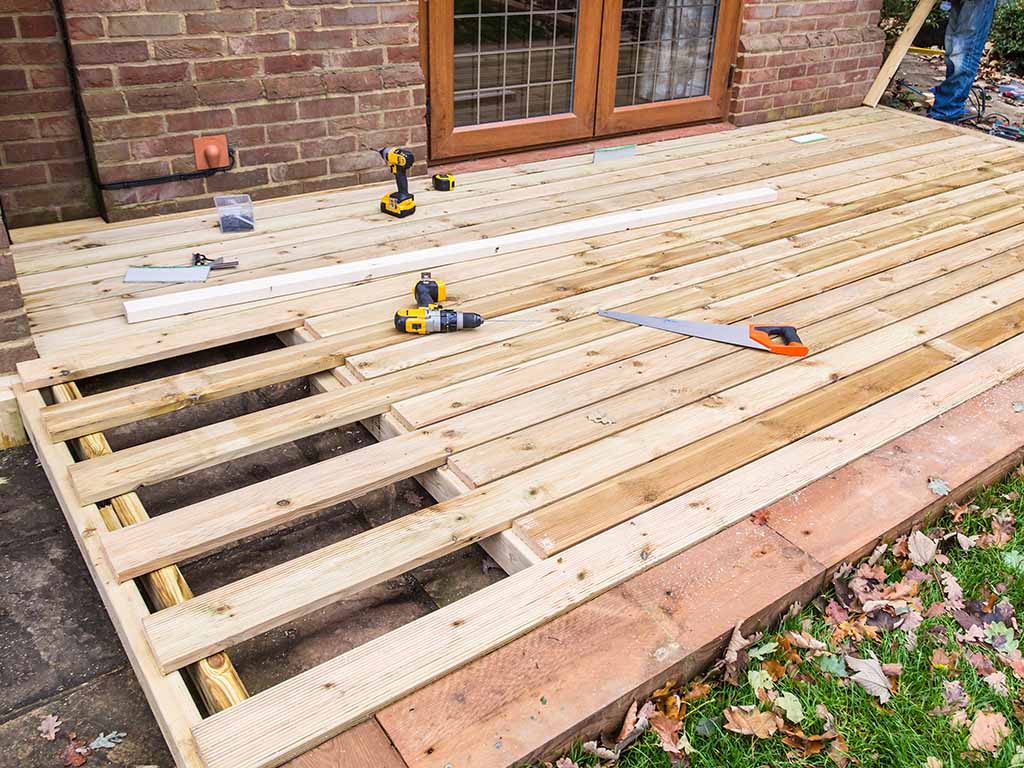Find peace of mind by hiring a licensed deck installer Austin who knows the local building codes.
Find peace of mind by hiring a licensed deck installer Austin who knows the local building codes.
Blog Article
How to Choose the Right Materials for Your Deck Setup Job
Selecting the suitable materials for your deck setup job can seem daunting. There are various elements to think about, from toughness and maintenance to visual appeals and environmental impact. The choice between typical timber and composite materials, each with its own set of advantages and disadvantages, can be especially difficult. The secret is to balance your budget, design preferences, and way of living needs to create a deck that will certainly boost your exterior space for years to come.
Recognizing the Different Kinds Of Deck Products
When beginning on a deck installment job, the selection of materials comes to be a crucial decision. Compound products, on the various other hand, are a blend of wood and plastic, giving sturdiness and resistance to weather components. By recognizing these differences, property owners can make a much more enlightened choice on the most ideal deck product for their specific needs.
Evaluating the Toughness and Upkeep Requirements of Deck Materials
Assessing the durability and upkeep requirements of deck products is a crucial action in deck setup. Sturdiness involves the product's capability to endure harsh climate problems, wear and tear, and its longevity.
Recognizing maintenance requirements is just as vital. Some materials require normal sealing or staining to preserve their appearance and stand up to wetness damages, while others, like composite outdoor decking, demand less maintenance. By examining these elements, one can pick the most ideal decking product, making sure a balance in between longevity, maintenance needs, and aesthetic allure.
Expense Evaluation: Comparing Timber and Composite Decking
Although price may at first look like an additional problem, it is a considerable factor when comparing timber and composite decking. Timber, usually a less pricey alternative, has a reduced ahead of time price. Nonetheless, over time, maintenance expenses can accumulate, possibly making timber a lot more expensive in the long run. These upkeep prices may include staining, sealing, or replacing damaged boards. On the various other hand, composite outdoor decking, while more expensive initially, calls for less maintenance, possibly reducing long-lasting expenses. It's crucial to remember that composite outdoor decking isn't impervious to put on and tear, and substitute costs can be high. For that reason, prospective deck proprietors should consider their budget and determination to maintain their decks when determining in between timber and composite decking.
Visual Appeals and Design Adaptability of Decking Materials
While price is a vital consideration, the visual allure and layout versatility of outdoor decking materials also play a considerable role in the decision-making process. Various products offer varying levels of aesthetic allure. All-natural timber outdoor decking offers a classic, ageless appearance, while composite products supply a vast array of shades and appearances to match diverse preferences and styles. Style versatility refers to the capability to shape and control the decking product to satisfy details design demands. Timber, for instance, supplies high design versatility as a result of its ease of cutting and forming. Compound materials, while less versatile in style, are still adaptable enough for a lot of deck layouts. These elements, consequently, are important components in the selection of decking material.
Environmental Effect of Decking Materials
When picking decking materials, one should think about not just looks and sturdiness, but also the environmental impact. It is essential to evaluate the sustainability of materials and check out recycled decking options. Understanding the possible effect on local environments will ensure an extra ecologically responsible choice.
Analyzing Product Sustainability
In the world of deck construction, examining product sustainability is a critical action. This involves evaluating the ecological impact of each prospective product, taking into consideration elements such as the power needed for its production, its carbon impact, and its end-of-life disposal or recycling alternatives. For example, timber is a sustainable resource, yet unsustainable logging practices can lead to logging. Additionally, composite outdoor decking materials usually integrate timber and plastic, reducing the need for brand-new timber however enhancing reliance on nonrenewable fuel sources. Aluminum and various other steels may be a lot more long lasting and recyclable, however their removal and processing can be energy-intensive. Hence, the choice of outdoor decking materials need to stabilize performance, looks, price, and sustainability to ensure a liable and long-lasting installment.
Recycled Outdoor Decking Choices

Composite outdoor decking is especially popular because of its longevity and convenience of maintenance. It's immune to rot, pests, and fading, making it a durable alternative. Recycled plastic outdoor decking, on the other hand, is extremely resistant and needs marginal upkeep. While these products might bring a greater first expense, their longevity and reduced ecological effect make them a wise financial investment for the eco-conscious property owner.

Influence on Local Environments
While the benefits of utilizing recycled materials for outdoor decking can not be overstated, it's similarly crucial to think about the broader ecological effects of these choices. The removal, handling, and transportation of products can exceptionally impact regional ecosystems. Logging for wood outdoor decking adds to habitat loss and climate change. Even the manufacturing of composite products can launch unsafe emissions. On the other hand, utilizing recycled or sustainably sourced products can help reduce these effects. Thinking about the life-span of materials can lower environmental effect; longer-lasting alternatives call for much less regular replacement, hence preserving sources. Correct disposal of old decking is vital to decreasing garbage dump waste. Essentially, an eco-conscious deck job demands mindful material option, lasting sourcing, and responsible disposal.
Making Your Decision: Tips for Selecting the Finest Deck Products
As the short article changes into the subtopic of "Making Your Decision: Tips for Picking the Finest Deck Products", it is important to recognize the variety of deck materials offered. Striking an equilibrium in between sturdiness and visual appeal is necessary in this choice procedure. The adhering to discussion will assist viewers in making an informed option based upon these vital considerations.
Comprehending Various Deck Products
The task of selecting the appropriate products for your deck installment can appear daunting because of the large variety of choices offered. read more Nevertheless, comprehending the various products can simplify this procedure. Timber is a prominent option, offering a classic visual and affordability. Types of timber made use of consist of pressure-treated lumber, cedar, and redwood. Composite materials, made from a blend of wood and plastic, are low-maintenance and immune to rot and bugs. Vinyl or PVC decks are a lot more sturdy and call for much less maintenance than composite materials, however they can look less all-natural. Last but not least, light weight aluminum decks are solid, lightweight, and immune to rot, however they are likewise the most expensive alternative. Each material has its very own advantages and drawbacks, making it crucial to consider your details requirements before making a decision.
Durability vs. Appearances Equilibrium
Stabilizing sturdiness with aesthetics can be a difficulty when picking deck materials. The decision usually boils down to personal choices and the deck's planned use. High-traffic areas may require sturdy materials like composite decking, which stands up to damage but might lack the natural appeal of timber. On the other hand, wood uses an this page ageless allure and warmth that synthetic products struggle to duplicate. However, it needs much more maintenance and may not last as long. House owners require to strike a balance, taking into consideration both the deck's practical needs and their visual preferences. By doing so, they can guarantee their deck remains a practical and appealing outside space for many years to find.
Final thought
To conclude, selecting the appropriate materials for your deck setup task requires cautious consideration of variables such as sturdiness, maintenance, expense, aesthetics, and environmental effect. Whether you opt for typical timber or composite products, your selection should straighten with your spending plan, design preferences, and way of life. Eventually, the most effective outdoor decking material is one that boosts your exterior space and offers pleasure for many years to find.
Report this page